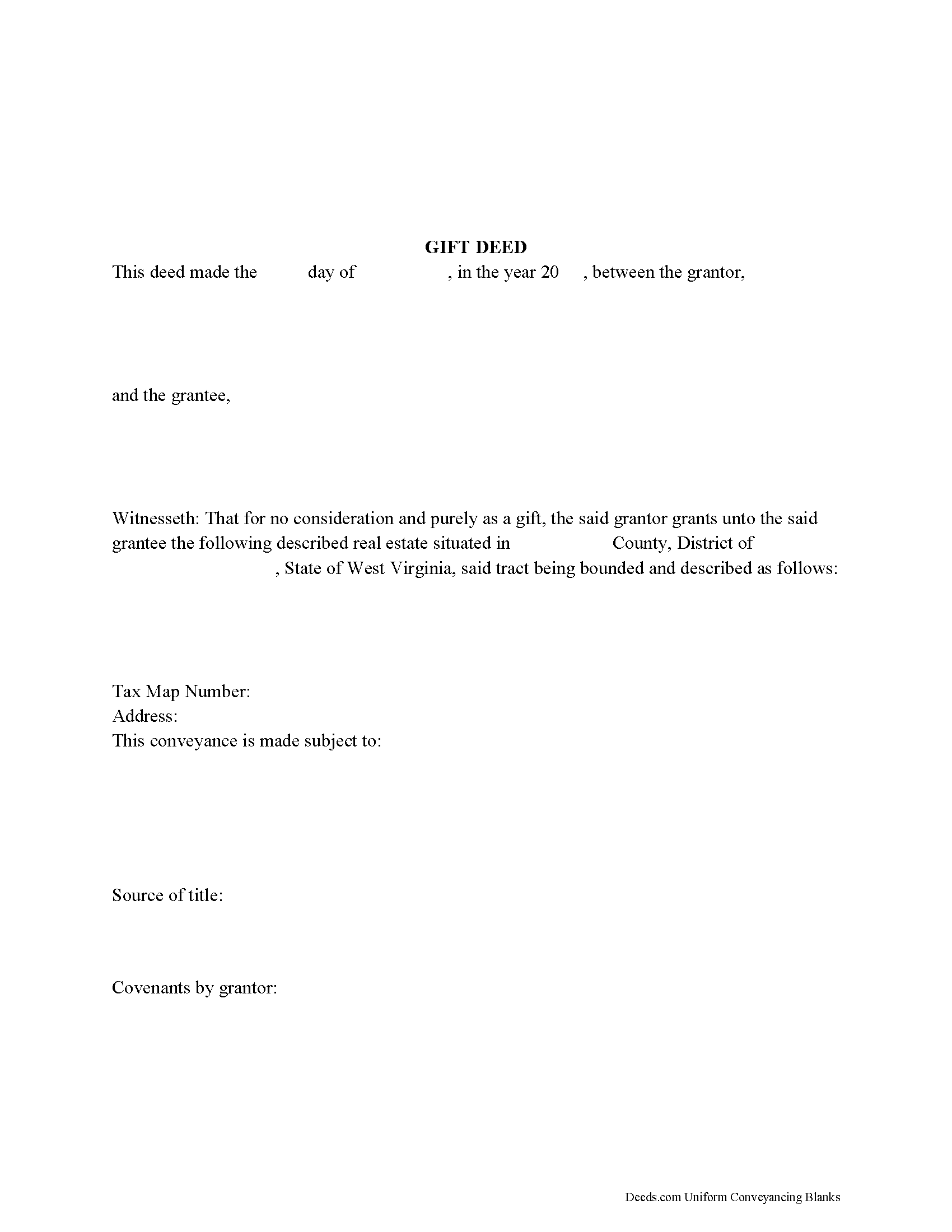Download West Virginia Gift Deed Legal Forms

West Virginia Gift Deed Overview

A gift deed, or deed of gift, is a legal document voluntarily transferring title to real property from one party (the grantor or donor) to another (the grantee or donee). A gift deed typically transfers real property between family or close friends. Gift deeds are also used to donate to a non-profit organization or charity. The deed serves as proof that the transfer is indeed a gift and without consideration (any conditions or form of compensation).
In order for a gift deed to be valid they must meet the following requirements: The grantor must intend to make a present gift of the property, the grantor must deliver the property to the grantee, and the grantee must accept the gift. A gift deed must contain language that explicitly states no consideration is expected or required, because any ambiguity or reference to consideration can make the deed contestable in court. A promise to transfer ownership in the future is not a gift, and any deed that does not immediately transfer the interest in the property, or meet any of the aforementioned requirements, can be revoked [1].
A lawful gift deed includes the grantor's full name and marital status, as well as the grantee's full name, marital status, mailing address, and vesting. Vesting describes how the grantee holds title to the property. For West Virginia residential property, the primary methods for holding title in co-ownership are tenancy in common and joint tenancy. A grant of ownership of real estate to two or more persons is presumed to create a tenancy in common, unless a right of survivorship is clearly stated in the conveyance (W. Va. Code 36-1-10 onward).
As with any conveyance of real estate, a gift deed requires a complete legal description of the parcel. Any survey document that a deed references should be prepared by a licensed surveyor and filed with a county clerk, and must also have the licensed surveyor's signature and seal or stamp affixed thereto (W. Va. Code 39-1-2c). Recite the source of title to establish a clear chain of title, and detail any restrictions associated with the property.
In West Virginia, the fee to record a deed of conveyance (without a plat) is $15 for the first five pages and $1 for each additional page. A preservation fee is added to every recorded instrument and is $1 for documents with 1-9 pages, $2 for documents with 10-19 pages, and an additional $1 for every ten pages (W. Va. Code 59-1-10)
Every person who records a document in West Virginia is subject to pay a state excise tax when transferring title to real estate. The rate of the combined state and county excise tax is $4.40 for each $1,000 of value and is payable upon recording. The payment of the tax is evidenced by the affixing of documentary stamps on the document. Copies are $1.50 for the first two pages and $1 for each additional page. To certify a copied document costs an additional $1 (per document). All documents not listed are $10 for the first 5 pages and $1 for each additional page. Pages with printing on both sides will count as two pages (W. Va. Code 11-22-2).
The grantor is responsible for paying the Federal Gift Tax. The IRS implements a Federal Gift Tax on any transfer of property from one individual to another with no consideration, or consideration that is less than the full market value. In accordance with federal law, individuals are permitted an annual exclusion of $15,000 on gifts. This means that if a gift is valued below $15,000, a federal gift tax return (Form 709) does not need to be filed. However, if the gift is something that could possibly be disputed by the IRS -- such as real property -- a grantor may benefit from filing a Form 709 [2].
In West Virginia, there is no state gift tax. For questions regarding state taxation laws, consult a tax specialist. Gifts of real property in West Virginia are, however, subject to the federal gift tax. The grantor is responsible for paying the federal gift tax; however, if the grantor does not pay the gift tax, the grantee will be held liable [1].
With gifts of real property, the recipient of the gift (grantee) is not required to declare the amount of the gift as income, but if the property accrues income after the transaction, the recipient is responsible for paying the requisite state and federal income taxes [3].
This article is provided for informational purposes only and is not a substitute for the advice of an attorney. Contact a lawyer with any questions about gift deeds or other issues related to the transfer of real property. For questions regarding federal and state taxation laws, consult a tax specialist.
[1]
https://nationalparalegal.edu/public_documents/courseware_asp_files/realProperty/PersonalProperty/InterVivosGifts.asp
[2] http://msuextension.org/publications/FamilyFinancialManagement/MT199105HR.pdf
[3] https://www.irs.gov/businesses/small-businesses-self-employed/frequently-asked-questions-on-gift-taxes
(West Virginia Gift Deed Package includes form, guidelines, and completed example)